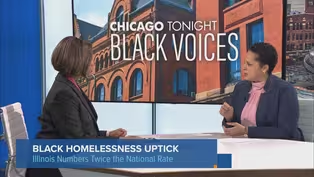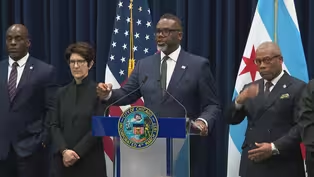Chicago Tonight: Black Voices
Biden Bans Medical Debt From Appearing on Credit Reports
Clip: 1/15/2025 | 7m 27sVideo has Closed Captions
An estimated $49 billion of debt would vanish from Americans' credit histories under the new plan.
The Consumer Financial Protection Bureau announced plans to erase medical debt from credit reports. Critics say the move will do more harm than good, and a legal challenge is underway.
Problems playing video? | Closed Captioning Feedback
Problems playing video? | Closed Captioning Feedback
Chicago Tonight: Black Voices is a local public television program presented by WTTW
Chicago Tonight: Black Voices
Biden Bans Medical Debt From Appearing on Credit Reports
Clip: 1/15/2025 | 7m 27sVideo has Closed Captions
The Consumer Financial Protection Bureau announced plans to erase medical debt from credit reports. Critics say the move will do more harm than good, and a legal challenge is underway.
Problems playing video? | Closed Captioning Feedback
How to Watch Chicago Tonight: Black Voices
Chicago Tonight: Black Voices is available to stream on pbs.org and the free PBS App, available on iPhone, Apple TV, Android TV, Android smartphones, Amazon Fire TV, Amazon Fire Tablet, Roku, Samsung Smart TV, and Vizio.
Providing Support for PBS.org
Learn Moreabout PBS online sponsorship>> If >> you're one of around 100 million people in the U.S. who struggle with medical debt help may be on the way the Consumer Financial Protection Bureau recently announced its plan to erase medical debt from credit reports.
An estimated 49 billion dollars would vanish from millions of Americans.
Credit histories.
But critics say the move will do more harm than good.
And a legal battle is underway.
Joining us now via zoom are Anthony Barr, director of research and impact of the National Bankers Association.
And Eva Stall.
The vice president of policy and programs at undue medical debt.
Thanks to you both for joining us.
Anthony Barr, let's start with you, please.
How does medical debt affect people's lives?
>> Absolutely so critical as it currently stands as something that any of us can experience at any time, really don't necessarily always think about that for a realty, but experiencing a medical emergency or having the high cost, you know, medical care that exceeds our ability to pay commanders with that medical debt.
And then in the status quo that shows up on your credit history and therefore it dampens your credit score, which then downstream from that can impact your ability to access capital and credit.
So you might be less likely to be proof that mortgage or that small business loan or that car loan or even if you are approved, you might end up paying more at terms for that loan that are less favorable.
And so it really is something is it is a significant challenge specifically for households that already experience of financial constraints or a lack of access to prior financial products in the banking system.
>> Eva Stahl, how does your organization medical debt?
How do you work to address these burdens?
>> Or so, first off, I would say that we're really excited about this.
Change.
Your medical debt is not the dead of choice, right into debt of city.
So we're national nonprofit that works with donors to raise funds to abolish medical debt in bulk.
We do this by flipping the script of what a debt collector would do.
So in other words, you know, if you if you approach a hospital or a big provider practice, they might use a debt collector or 2 try and collect on these debts.
Once they've gone through that process, they might sell that debt.
So that debt collection process can start again.
So that's where we intervene and say don't sell to a buyer or a debt collector rather than sell to us.
And so we pay pennies on the dollar and abolish the step with donated dollars and left our constituents know that they're free and clear of this medical debt.
And we do that in a way that we make sure that we have an opportunity to learn their stories to hear back from them about their experiences with medical debt.
And we know that the issue of credit is one that hangs over people along with a lot of anxiety and mental distress.
>> Anthony Weiner, black Americans disproportionately affected by medical debt.
>> Absolutely.
So nationally, it's really about what resources you have.
And so, you know, Brookings Report looking nationwide found 80% of medical debt is held by households with 0 or negative net worth.
So we're already in terms of the racial disparities talking about, you know, all things redlining You know, that has kind of led to huge disparities starting out in terms your network in their 40 bility to pay for medical care here in Chicago at 2024. caller.
Well, study found that 29% of black households in Chicago have medical debt versus only 18% white household.
And then thinking again about that credit journey, right, that deepening your credit score making it harder to access, you know, a mortgage or something like that.
We see some dumb down.
Stream effects there as well.
So in Chicago, White families have a home ownership rate around 72%.
According to that same study only 34% for black households.
>> Even Cook County has been a proactive player, medical debt relief use utilizing American rescue plan funds to eliminate 382 million dollars in debt for 200,000 residents.
How will this rule from the Consumer Financial Protection bureau affect residents in Cook County?
>> Sure.
So, you know, as Anthony Laid-out, it's really important to remove medical debt from credit reports because it doesn't really predict people's credit worthiness because it's not really a debt of choice.
So why have these debts that people don't anticipate really cloud their credit picture.
So I think for all people across the country, this will be a huge relief to have this removed from their credit reports, specifically for residents locally.
When we work with hospital partners in Cook County to relieve debt.
Part of our contractual requirement is that they remove any marks from a negative marks from a credit report.
So the way it works is that is whoever puts that bad credit mark on a credit report needs to remove it.
And so that is actually part of our process, which has been really helpful to residents.
But I think knowing writ large that medical that will be removed from credit reports just bring such a sense of relief and allows people to kind of take a deep breath and maybe think differently about their health care journey because really at the end of the day, what we want for patients is to return to care.
And we know from pull in study after study that one of the greatest fears people have in accessing health care is the death that they might accrue.
>> Not everybody's on board with There are opponents of this proposal who argue that will it will incentivize people to just skip paying their medical or and that it should be included in credit reports because if you're not paying your medical bills, maybe you're not paying your loans for your car or your credit card.
For example, House Financial Services Committee Chairman French Hill of Arkansas blasted this rule in a statement after the announcement saying, quote, instead of focusing on enhancing economic opportunity for all consumers, Chopra, he's referring to the director of the CFPB here.
Chopra's regulatory overreach will drive up costs to any American seeking medical care and have a devastating impact on consumers.
Access to health care, particularly in rural areas.
not a whole lot of time.
Anthony, I'm gonna come to you first on that one.
What do you say to that?
>> Yes, oversaw anticipated that there would be some pushback along these lines and so they come to study even before this rule is finalized.
Looked at, you know, is this a good predictive value for repaying loans found that it's not?
And in our experience in minority banking sector, which represents representatives, you know, who are organizations as community wonders, mission-driven lenders are used to looking past credit scores.
We actually have research on their mortgage lending showing that, you know, they're less likely to deny based on credit for example, because they're looking at other factors like rent.
History has an ability to repay.
So I knew I challenge that assertion that it's going you know, some help distort the credit market word or make it make underwriting reliable.
And I know is that and know there going have start why I was just going to chickens are out of time.
The Consumer Data Industry Association which represents debt collectors, they have filed a lawsuit about this.
Of course.
>> Their claim is that the rule violates the Fair Credit Reporting Act.
Some more to come on this.
Obviously.
We'll see how that plays out.
But that we'll have to leave it
Black Illinoisans Are Experiencing Homelessness at a High Rate
Video has Closed Captions
Clip: 1/15/2025 | 7m 49s | A new report says homelessness among Black Illinoisans is more than twice the national average. (7m 49s)
City Council Rejects Push to Weaken Protections for Undocumented Immigrants
Video has Closed Captions
Clip: 1/15/2025 | 3m 37s | After days of increasing alarm among advocates for immigrant rights, the showdown was anticlimactic. (3m 37s)
Providing Support for PBS.org
Learn Moreabout PBS online sponsorship
- News and Public Affairs

Top journalists deliver compelling original analysis of the hour's headlines.

- News and Public Affairs

FRONTLINE is investigative journalism that questions, explains and changes our world.












Support for PBS provided by:
Chicago Tonight: Black Voices is a local public television program presented by WTTW

